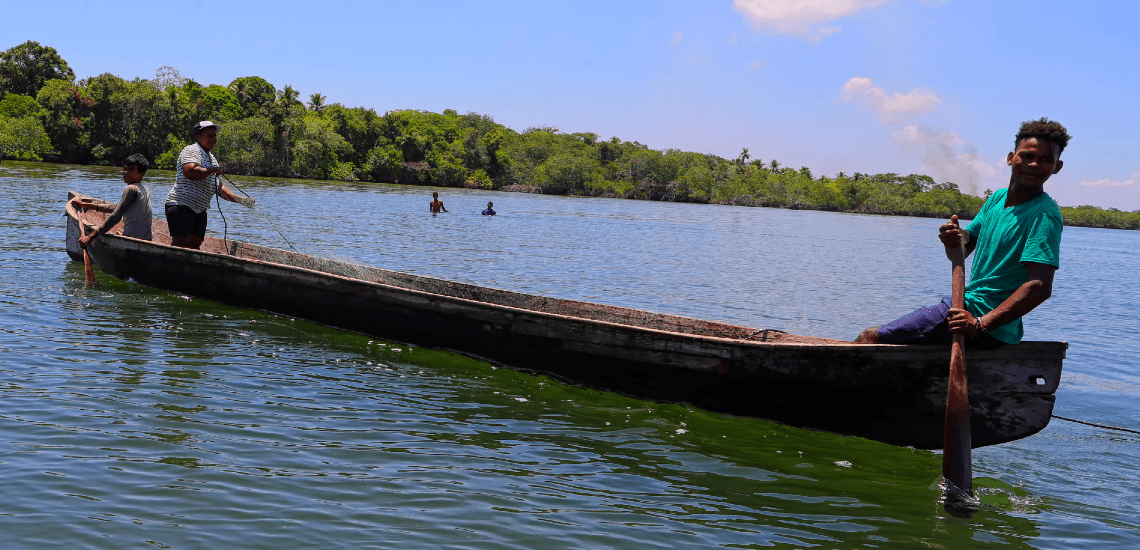 Indígenas de la etnia Miskita ubican redes de pesca en la comunidad de Yahurabila, Honduras.
Indígenas de la etnia Miskita ubican redes de pesca en la comunidad de Yahurabila, Honduras.
Ocean-based natural capital valued at US$24 billion faces serious threats from pollution, global warming, mangrove destruction and overexploitation of ocean resources. With 70 percent of the planet's surface covered by oceans, water plays a key economic role, as well as having a major bearing on global climate regulation, the development of coastal communities, and the well-being of millions of people. Healthy oceans are essential to achieve sustainable, inclusive, and resilient development to benefit people and the planet as a whole.
Although Latin America and the Caribbean, with its vast marine area of more than 18,723,000 square kilometers, faces significant challenges, several countries in the region have deployed actions aimed at achieving a sustainable and resilient “blue” economy . The blue economy focuses on the sustainable development of oceans and their resources in order to generate employment and boost economic growth while preserving marine assets.
Challenges in developing the blue economy in the Caribbean
Developing a blue economy still faces many challenges. For example, increasing contamination by sargassum seaweed affects many Caribbean countries: the proliferation of sargassum undermines people’s health, livelihoods and economic activities, especially in sectors such as tourism, fishing and maritime transport. Moreover, decomposing sargassum generates hydrogen sulfide which produces unpleasant odors and can cause damage to health if people are exposed to it for long periods. Large amounts of this algae can also affect the tourism industry by restricting access to beaches by locals and tourists.
Despite the many challenges, the World Bank supports numerous countries in the region in their efforts to develop a blue economy . I would like to share two examples:
- Dominican Republic
Tourism plays an important role in the Dominican Republic’s economy. Prior to COVID-19, coastal and marine tourism represented 15 percent of Gross Domestic Product (GDP). However, the high costs of cleaning the beaches and managing sargassum has had a negative impact on the country’s earnings from the tourist trade.
The World Bank conducts analyses of the economic and health impacts of sargassum and supports the design of sustainable seaweed management measures. These include innovations to enable income to be generated from harvesting and reusing seaweed in the Dominican Republic and other Caribbean states.
2. Central America
The challenges are not confined to the Caribbean coast of Central America. On the coasts facing the Pacific, it is crucial to protect the more than 500,000 hectares of the Eastern Tropical Pacific Marine Corridor (CMAR) initiative. This “corridor” is a vital migratory route for turtles, whales, sharks, manta rays, and other species. This regional ocean conservation effort includes involving Panama, Costa Rica, Colombia and Ecuador in efforts to protect these species from illegal fishing, and promote sustainable tourism . Achieving the objectives of the initiative, guided by blue economy principles, requires changes to be adopted in the policies and allocation of financial resources.
Meanwhile, PROBLUE - a World Bank-administered trust fund that promotes the development and sustainable management of marine resources – will provide support to help set in train CMAR mechanisms in Central America, with Panama and Costa Rica tasked with strengthening the integrated regional management of the Marine Corridor. Support will also be forthcoming for the design of programs to promote the protection of species, boost sustainable tourism, and generate income for coastal communities.
The World Bank reaffirms its commitment to work alongside all the countries of the region in their efforts to select and carry out actions that can contribute to protecting their marine biodiversity and to promote blue, sustainable, and resilient economies with positive impacts on the lives of the entire population of the region.
To receive one article a week,
Related articles
- Unleashing the blue economy of the Eastern Caribbean
- Let's give back to nature what nature gives to us


Join the Conversation